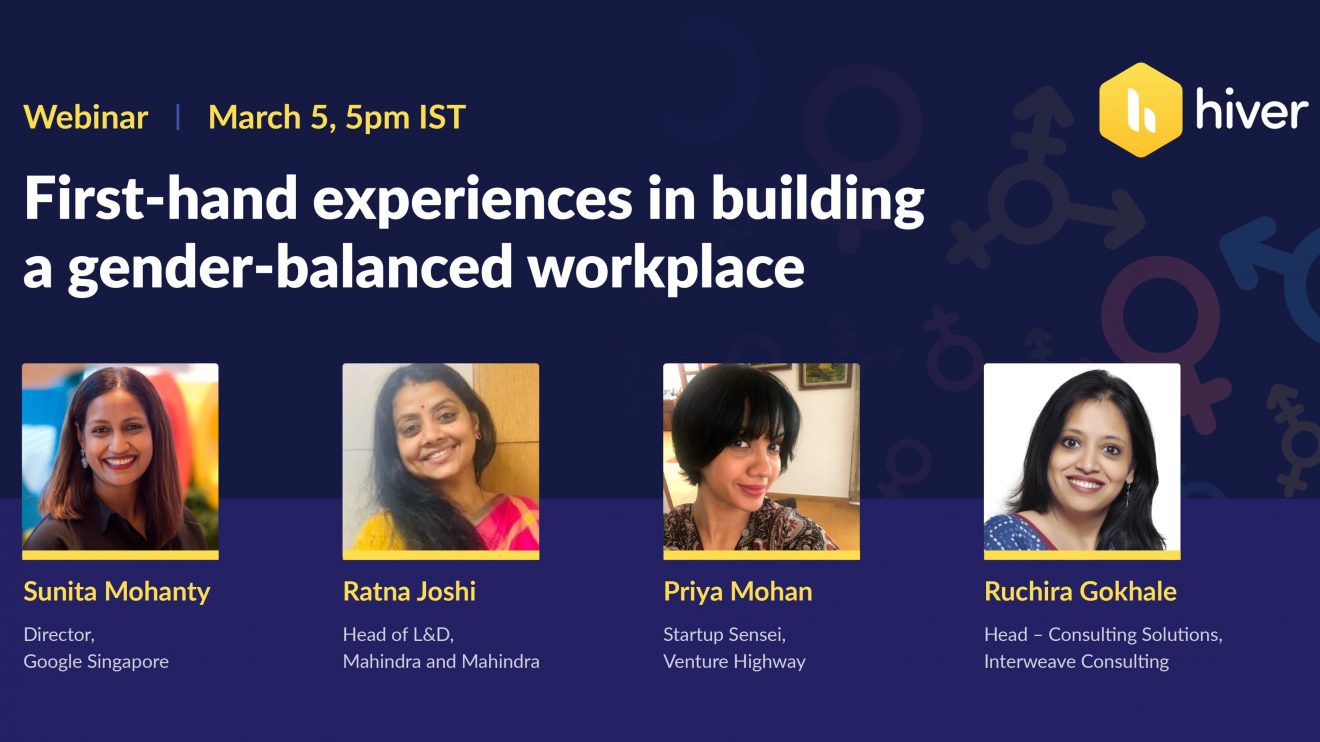Hiver recently hosted an industry discussion about the importance of a gender-balanced workplace. The panel featured four highly-prolific women leaders from different realms of expertise in the startup ecosystem. The conversation brought out insights about challenges in diversity hiring, and how companies can build a more inclusive workplace.
Hiver is a Gmail-based customer service solution that helps organizations collaborate on shared inboxes like services, orders, support.
The gender-balanced workplace
According to LinkedIn’s Opportunity Index 2021, 85 percent of working women have missed out on a raise, promotion or work offer because of their gender. The report also highlights that in India one in five working women express that companies exhibit a ‘favorable bias’ towards men at work. This statistic represents the larger trend of working women across Asia-Pacific countries (APAC) facing the strongest gender bias.
So, on March 5, Hiver organized their webinar, “First-hand experiences in Building A Gender-Balanced Workplace,” to address these issues. During the webinar, attendees familiarized themselves with women leaders in India who are campaigning to bridge this gender divide.
Moderated by Mohita Nagpal, VP Marketing at Hiver the webinar’s panel included:
- Sunita Mohanty – Trust & Safety Director at Google & Investor at Xoogler Angels
- Priya Mohan – Startup Sensei at Venture Highway
- Ruchira Gokhale – Head of Consulting Solutions at Interweave
- Ratna Joshi – Head of Learning & Development for Mahindra & Mahindra
The panelists spoke about what diversity means to them and how organizations today are hiring for diversity. Priya Mohan of Venture Highway, a Founder turned VC, said, “In hiring, diversity is often looked at from the perspective of fulfilling a quota, and it isn’t that. It’s important to democratize the opportunity but not lower the bar.” She also pointed out the privilege associated with diversity hiring – “Startups and VCs being young organizations have the opportunity to build a culture of diversity from the beginning. It comes at a significant cost that not all organizations have the privilege to bear.”
Sunita Mohanty, Trust & Safety Director for Google, believes that one of the greatest challenges in diversity hiring right now is the fact that it doesn’t immediately reflect on the ROI – “Diversity and inclusion are so much beyond numbers. However, most business leaders’ strategy decisions are hugely number-driven.”
The pandemic’s impact
The discussion also touched upon the impact the pandemic had on the gender-balanced workplace. According to Ruchira Gokhale, Head of Consulting Solutions for Interweave, “Global data reveals that women are almost twice as vulnerable to job losses as compared to men during the pandemic. But, in India, women were almost seven times more vulnerable in layoffs during the pandemic.” She recounted how one of her client organizations had to scrap a lot of non-core roles because of the pandemic, and how women employees were in a majority of those roles. “Upskilling women for re-employment is now going to be key,” she suggested.
Apart from the roles that organizations have to play in creating gender-balanced and inclusive workplaces, the panelists discussed the importance of women empowering themselves as well.
According to Ratna Joshi, Head Learning & Development for Mahindra & Mahindra, it’s important for women to understand their own boundaries and ambitions. “Organizations and women, both have to come together. No organization can support you if you don’t have your vision and ambition clearly defined,” she said.
Before concluding the session, panelists also brought to light how unconscious bias and microaggressions at workplaces can reinforce certain stereotypes against women. The panelists added that it’s important for men to become allies and help champion the cause of gender-diversity in their own way.







Add Comment